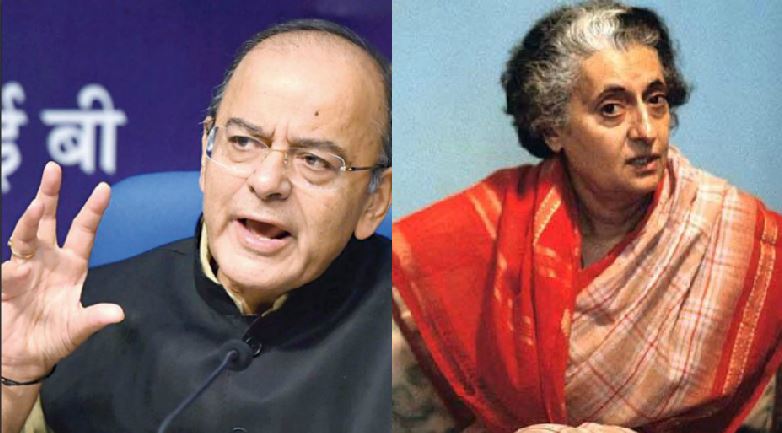Union Minister Arun Jaitley on Monday launched a scathing attack on the Congress and compared former Prime Minister Indira Gandhi, who imposed Emergency, to Adolf Hitler, alleging that both leaders used the Constitution “to transform democracy into dictatorship”.
On the 43rd anniversary of imposition of Emergency, Jaitley noted that unlike the German dictator, Gandhi went ahead to transform India into a “dynastic democracy”.
Advertisement
Comparing the former PM to Hitler, Jaitley wrote that her actions echoed Hitler’s Reichstag episode. Reichstag is the German word for Parliament.
“Mrs. Gandhi’s imposition of Emergency under Article 352, suspension of fundamental rights under Article 359 and her claim that ‘disorder was planned by the opposition in the country’, echoed Hitler’s ‘Reichstag’ episode as exposed by the Nuremberg trials after 13 years,” Arun Jaitley said in a series of tweets.
“Both Hitler and Mrs. Gandhi never abrogated the Constitution. They used a republican Constitution to transform democracy into dictatorship. Hitler arrested most of the opposition Members of Parliament and converted his minority Government in Parliament into a 2/3rd majority government,” he said.
In the second blog of a three-part series, Jaitley wrote Hitler, who became the German Chancellor on January 30, 1933, got his President to invoke Article 48 of the country’s Constitution which gave emergency powers for the “protection of people in the State”.
“The decree giving emergency powers put restrictions on personal liberty, free speech… The pretext for imposition of Emergency was that on February 27, 1933, German Parliament House, known as ‘Reichstag’, had been set on fire.
“Hitler claimed that it was a communist conspiracy to burn Government buildings and museums. Thirteen years later, in the Nuremberg trials, it was established that Reichstag fire was the handiwork of Nazis and Goebbels had conceived it.”
Highlighting that Hitler arrested most opposition MPs, Jaitley added that “Indira Gandhi arrested most opposition MPs and, therefore, procured, through their absence, a two-third majority of members present and voting and enabling the passage of several obnoxious provisions through Constitution amendments.”
The BJP leader said the 42nd Amendment diluted the power of High Courts to issue writ petitions, “a power which Dr. (B.R.) Ambedkar had said was the very heart and soul of India’s Constitution”.
“They also amended Article 368 so that a Constitution amendment was beyond judicial review. There were a few things that Hitler did not do which Gandhi did.
“She prohibited the publication of Parliamentary proceeding in the media. The law which gave mandate to the media for publishing Parliamentary proceedings was popularly known as the Feroze Gandhi Bill,” he said.
Since Hitler’s own election had been set aside, he had no change to make in this regard.
“Gandhi amended both the Constitution and the Representation of People Act. The Constitution amendment made the election of the Prime Minister non-justiciable before a court.
“The Representation of People Act was retrospectively amended to insert those provisions so that the invalid election of Gandhi could be validated by changes in law.”
He said amendments to the Constitution made during Emergency were later reversed by the Janata Party government.











